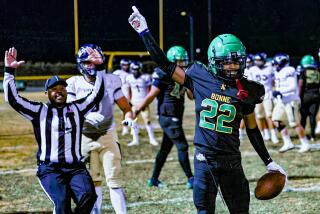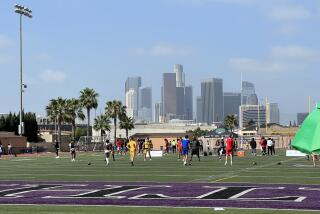COMMENTARY : Place Evidence on the Table in Welch Case : Prep football: An open hearing by the Southern Section would benefit everyone concerned.
- Share via
Now that Canyon High has decided to fight the one-year suspension that faces football Coach Harry Welch, the debate centers on the severity of the punishment.
Is the penalty fair?
Canyon Principal Bill White, Welch and Canyon players and boosters believe the penalty is too stiff, claiming the punishment is ill-suited to the crime. The Southern Section’s executive committee recommended the penalty last week after concluding that Welch broke section rules by conducting an off-season practice.
Undoubtedly, many outside the Canyon community will support the ruling, saying the Southern Section acted fairly. But Welch, who has posted a record of 100-19-1 in nine seasons, has many admirers. Already, The Times has received calls from some who criticize the penalty.
However, the best assessment of the penalty based on the facts presented so far is, “Only Stan Thomas knows for sure.”
The Southern Section commissioner is the only person in a position to judge Welch. And that’s part of the problem.
This is not intended as a defense of Welch. If the Southern Section is able to demonstrate that Welch routinely violated rules--a charge leveled by many of his rival coaches--then Welch should take a seat for the next year and examine his ethics and approach to coaching.
The rule is a good one. It is designed to protect athletes from overzealous coaches and should be enforced vigorously.
The rule forbids football teams from practicing for longer than one class period from the end of the season until the start of spring practice May 20. In addition, the rule prohibits the use of sleds, blocking dummies and other football equipment.
A photograph in the May 19 issue of the Newhall Signal shows a Canyon football player in shorts hitting a blocking dummy in the presence of several teammates and assistant Brian Stiman. The photograph was taken after school May 7.
Welch admits a violation occurred, but he denies that he violated the rule. He has agreed to sit out a year if he is proved guilty.
“If the evidence shows that I systematically violated that rule, I will accept the penalty,” Welch said Tuesday.
Welch not only denies that he repeatedly broke the rule but denies he has broken it at all in the past year.
“If you ask me if I consciously violated the rule, had meetings with players on Sunday, was throwing balls on Sunday or running plays after 3 p.m., I can’t think of one violation in the past year. I’m high profile. If I was doing that, someone would have seen me doing it,” he said.
The troubling aspect of the case so far is that a penalty has been issued before a public hearing has been convened to evaluate Welch’s guilt or innocence. The evidence either shows he broke the rule or it doesn’t.
And who is privy to the evidence? Only Thomas.
Thomas is a fair man. He has established an impressive record in five years as commissioner. Thomas is a plain-speaking, tough-minded man who aggressively pursues his duties.
He seems to relish the difficult cases. When accusations of recruiting violations surfaced around the Montclair Prep football program, Thomas handled the investigation himself. He took the same hands-on approach when the Southern Section learned of possible violations in the Canyon football program. Thomas drove out to Canyon High himself to investigate.
That’s commendable in a commissioner. He is no paper-pushing bureaucrat who hides in his office when trouble looms. He oversees the largest section in the state, administering 482 schools. In a section so large, it is impossible to police all schools and eliminate rules violations. Thomas’ aggressiveness helps discourage wrongdoing and that’s good for all schools.
Still, the procedures in the Canyon case raise questions about Thomas’ role. After Thomas investigated Canyon, he called a meeting of the executive committee, a 17-member panel consisting of principals, administrators and athletic directors from member schools.
When the Canyon case was called, the meeting was closed. Thomas recommended a one-year suspension for Welch and the executive committee agreed after hearing from Thomas only.
Thomas might have an overwhelming case against Welch whereby a one-year suspension might seem merciful. Unfortunately, Thomas has shared his case with the executive committee only.
In addition, Canyon will take its appeal to a three-member panel selected by Thomas from the executive committee. Even if that panel is able to render a just and unbiased decision, the appearance of prejudice exists. Presumably, the members of the panel already have decided Welch’s guilt and rendered a penalty.
Surely, the Southern Section can call on previous executive committee members who have experience with section rules but enter the hearing without having ruled already on the case.
If Canyon rejects the panel’s verdict, the school can appeal to the California Interscholastic Federation and then take its case to the courts. Thomas insists that the school will get a fair hearing and that he will have no objections if the appeals panel overturns his decision.
“I’ve had many decisions overturned before,” Thomas said. “I’m not so big into this that I can’t listen. If Harry Welch can present a case that shows we erred, I’ll step back and listen.”
Still, it is understandable for people to conclude that the jury already is in. If Welch weren’t guilty, why else would the section recommend a one-year suspension?
Before judgment was passed, an open hearing that presented the Southern Section case and included the Canyon defense should have been required.
Welch is right, he is high profile. He has won three Southern Section titles. Given the stakes involved, an open hearing seems like a reasonable request.
More to Read
Get our high school sports newsletter
Prep Rally is devoted to the SoCal high school sports experience, bringing you scores, stories and a behind-the-scenes look at what makes prep sports so popular.
You may occasionally receive promotional content from the Los Angeles Times.






